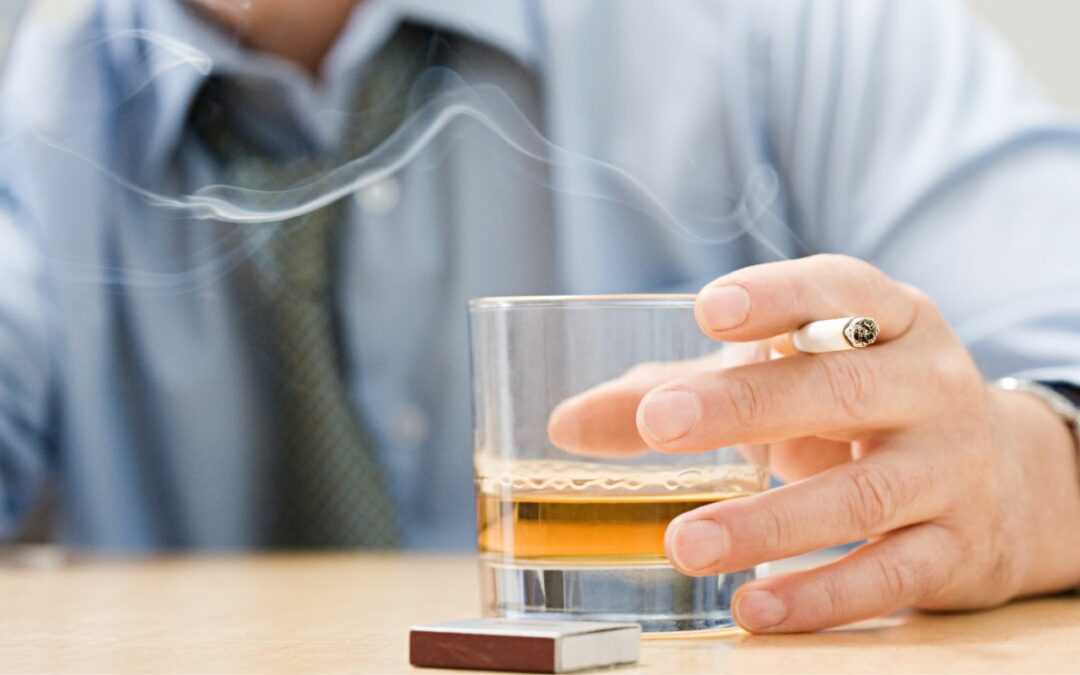Did you know that smoking and drinking can increase the risk of developing hearing loss? Studies identify smoking and drink as factors that can contribute to causing hearing loss. Nearly 1 in 6 people have some degree of impaired hearing which affects over 48 million people. Hearing loss is the third most common medical condition that people live with today. 90% of the hearing loss people experience is permanent which reduces capacity to hear and process speech as well as sound. This stains communication,producing multifaceted effects that not only impacts relationships but also health. Identifying and addressing risk factors like smoking and drinking can help prevent hearing loss and protect hearing health.
Research Linking Smoking, Drinking, & Hearing Loss
Research shows that there is a correlation between smoking, drinking, and hearing loss. These behaviors and patterns can damage the auditory system – the sensory system for hearing . Studies that investigate this link include:
- 2019 study published in the Nicotine & Tobacco Research Journal: researchers evaluated the impact of smoking on hearing by assessing nearly 50,000 people (ages 20-64) for 8 years. Researchers collected data on smoking behavior and hearing health and found that compared to nonsmokers, smokers were:
- 60% more likely to develop high-frequency hearing loss
- 20% more likely to develop low-frequency hearing loss
This shows that smokers were scantily more likely to develop hearing loss. Researchers
I also found that the more one smoked, the higher the risk of hearing loss.
- 2019 study published in the Journal of Audiology & Otology: researchers collected and analyzed data from a national health survey. This included data from hearing tests and a questionnaire that assessed drinking patterns for 3,860 people who were 20 years old and above. Researchers found that:
- participants who reported their drinking as hazardous were 2.5 times more likely to experience hearing loss compared to those who identified their drinking as appropriate.
These studies are part of the greater research that shows smoking and drink can impact hearing health and are risk factors for hearing loss.
Impact of Smoking & Drinking on Hearing Health
Smoking and drinking can affect hearing health in a few ways. Nicotine and alcohol can damage blood vessels and reduce blood oxygen levels. This slows the circulation of blood throughout the body including in the ears. This can impact how sound is absorbed and processed, specifically by impacting the sensory cells in the inner ear.
There are thousands of hair cells in the inner ear which play a major role in how sound is processed. These sensory cells convert incoming sound waves into electrical signals which get carried to the brain. Specific portions of the brain receive this and continue to process these signals, assigning meaning to them which is how we are able to understand what we hear. Reduced blood supply to these cells can reduce their capacity to function effectively, reducing the auditory input the brain receives and producing hearing loss.
Tips to Protect Hearing Health
There are a few safety measures you can practice to reduce your risk of developing hearing loss. Integrating the following tips can protect your hearing health and wellness:
- Reduce or eliminate intake: studies show that the greater the intake of smoking and drinking, the higher the risk becomes for developing hearing loss. Reducing or eliminating consumption can alleviate this risk.
- Have hearing tested regularly: integrating hearing tests into annual health check-ins is a great way to track your hearing health. Hearing tests involve a painless and noninvasive process that measures hearing capacity in both ears. This identifies any hearing loss and symptoms that may need to be treated.
- Reduce loud noise exposure: avoiding other hearing hazards is especially important if you engage in smoking and drinking. This includes reducing your exposure to loud noise (a common cause of hearing loss). You can do this by maintaining lower volume settings on electronic devices, avoiding noisy even rivonia mts especially during peak hours, taking alternate routes to avoid construction or traffic, driving with the windows rolled up to reduce environmental noise etc.
Practicing these safety measures can significantly reduce your risk of developing hearing loss. You can start prioritizing your hearing health by contacting us to schedule an appointment for a hearing aid consultation!


